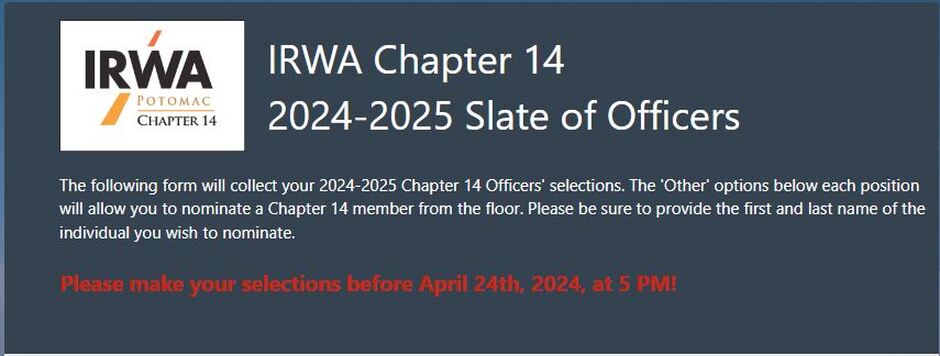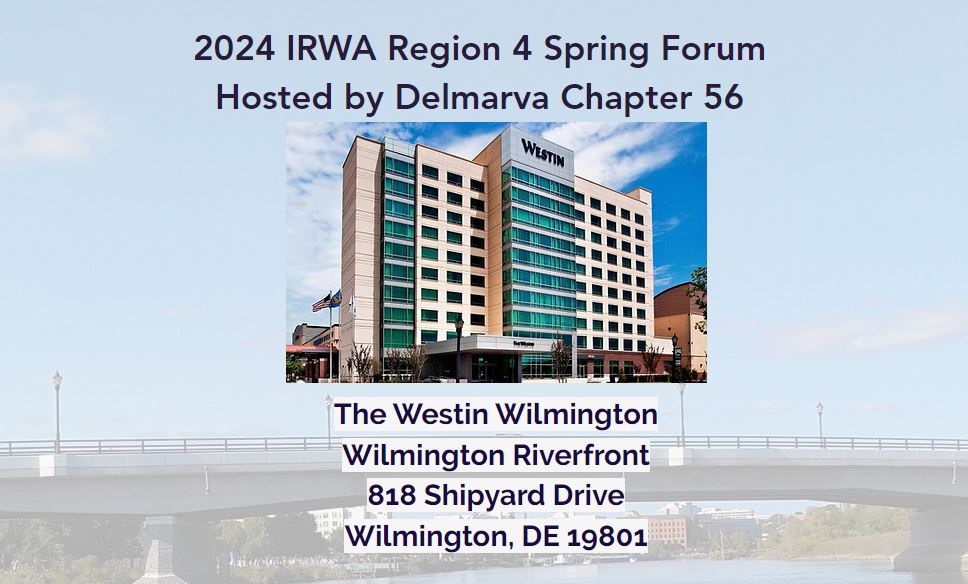Paying via Zelle?
Chapter Calendar.
See 14Now. for a schedule of upcoming meetings and events!
The time of year is upon us to cast our votes for the 2024-2025 Chapter 14 Officers! Let your voice be heard by casting your vote! The deadline to vote will be by 5PM on April 24th, 2024. Please click on the image below to access the electronic ballot. Don't wait, cast your vote today!
See 14Now. for a schedule of upcoming meetings and events!
The time of year is upon us to cast our votes for the 2024-2025 Chapter 14 Officers! Let your voice be heard by casting your vote! The deadline to vote will be by 5PM on April 24th, 2024. Please click on the image below to access the electronic ballot. Don't wait, cast your vote today!
Presidents Corner.
Chapter 56 is hosting the Region 4 IRWA Spring Forum at The Westin
Wilmington, in Delaware, from April 17- April 19, 2024. For more details and
registration, please click on the flyer image below. We hope to see you
there!
Wilmington, in Delaware, from April 17- April 19, 2024. For more details and
registration, please click on the flyer image below. We hope to see you
there!
Right of Way Magazine & Infrastructure News.

COVER STORY: A Flourishing Foundation for Education.
An Interview with RWIEF President Leslie Finnigan, SR/WA
BY VIVIAN NGUYEN
Featured
In 1976, the Association voted to adopt a separate nonprofit foundation known as the Right of Way International Education Foundation. The main purpose of the Foundation was to raise and manage funding for education courses through programs, scholarships and awards to IRWA members. For almost 50 years, RWIEF has been a critical partner to IRWA in its support of the Association’s education initiatives and course offerings. As such, we invited RWIEF President Leslie Finnigan, SR/WA, to share her thoughts on the Foundation and where it stands today.
Click on the magazine image or the link below for the FULL ARTICLE
March/April 2024 IRWA Right of Way Magazine
FULL ARTICLE HERE
An Interview with RWIEF President Leslie Finnigan, SR/WA
BY VIVIAN NGUYEN
Featured
In 1976, the Association voted to adopt a separate nonprofit foundation known as the Right of Way International Education Foundation. The main purpose of the Foundation was to raise and manage funding for education courses through programs, scholarships and awards to IRWA members. For almost 50 years, RWIEF has been a critical partner to IRWA in its support of the Association’s education initiatives and course offerings. As such, we invited RWIEF President Leslie Finnigan, SR/WA, to share her thoughts on the Foundation and where it stands today.
Click on the magazine image or the link below for the FULL ARTICLE
March/April 2024 IRWA Right of Way Magazine
FULL ARTICLE HERE




